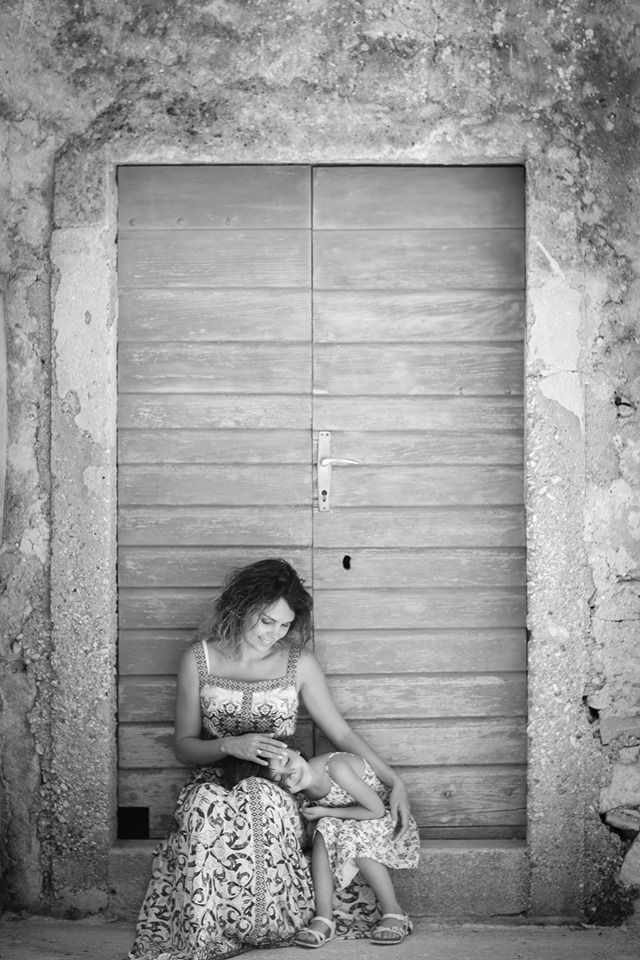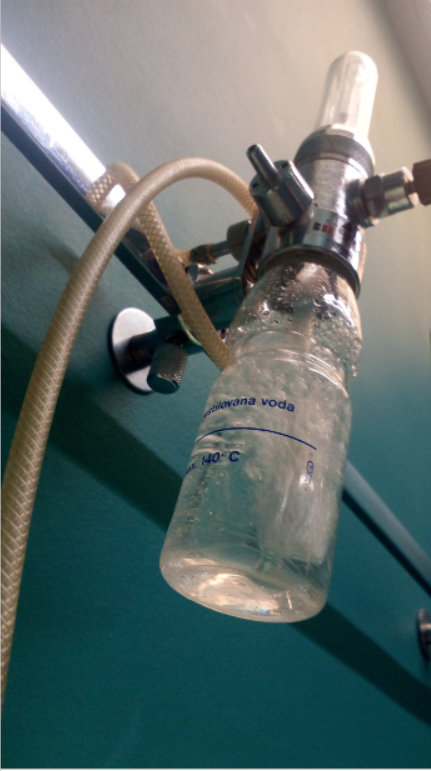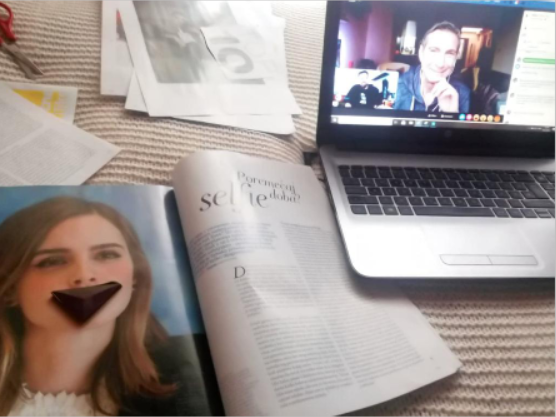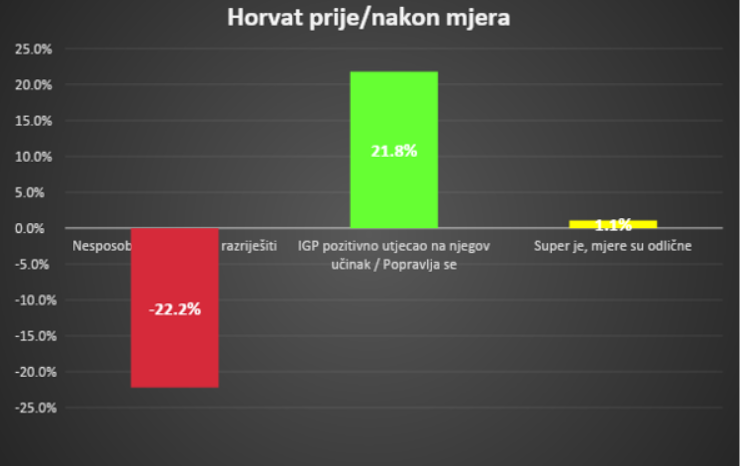Lika Destination Cluster Launches New Campaign: Stay Home, Plan a Holiday to Lika
April 5, 2020 - The Lika Destination Cluster wants you to stay at home now so you can enjoy the region later.
March, when spring travel or defining details for summer holidays usually takes place, has suddenly turned into the toughest month, much like all of this year.
The coronavirus pandemic currently affects all sectors of business and the livelihoods of people around the world, especially in the tourism sector.
Just because there is no tourist activity now does not mean that you should stop communicating on social networks. The focus should be on daydreaming, exploring, and planning your travel for later on.
Thus, HRTurizam reports that the most active tourist cluster in Croatia, the Lika Destination Cluster, is sending a message to all travelers: Stay home and plan a vacation to the Lika destination.
"We believe that when all this is over, the desire to discover new magical places will be greater than ever, and thus the experiences will be even more valuable. Excess free time is well-used for travel planning, and Lika is an indispensable dream vacation that offers a unique blend of land and sea where you have the opportunity to change as many as three climates and experience a unique contrast phenomenon,” the Lika Destination Cluster points out.
Lika Destination points out that the region is abundant in natural phenomena at all levels of protection, and as much as 60% of the Lika area is located in the NATURA 2000 ecological network and is extremely attractive for all forms of green tourism. ”In Lika, there are three of eight Croatian national parks (Plitvice Lakes, Paklenica and Northern Velebit) worth visiting at any time of the year. The destination also houses the birthplace of Nikola Tesla, the birthplace of Dr. Ante Starcevic, Europe's first printing press, and rich cultural heritage. Also, it is definitely recommended to visit protected natural areas,” the Cluster points out.
In addition to the natural resources, Lika has also been developing content for an active holiday from adrenaline activities such as ziplines, horseback riding, buggy rides, kayaking, and hiking.
When talking about Lika, we should definitely emphasize the authentic gastronomic offer, and especially the gastronomic delicacies with local ingredients from Lika Quality.
Currently, there are 169 products in the system from 59 manufacturers from the Lika area, which covers the area of Lika-Senj, Zadar and Karlovac counties.
Products under the Lika Quality label are available at the Lika Quality product point of sale at Plitvice Lakes National Park, where small local producers for the first time had the opportunity to sell their products under a common brand in one of the most visited places in Croatia. Soon the products will also be on sale in the Northern Velebit National Park, Paklenica National Park, and Velebit National Park and other protected areas in Lika.
"You can already dream of being warmed by the sun as you stroll through the Velebit meadows, feel the water drops from the powerful waterfalls of Plitvice Lakes and enjoy the flavors of traditional Lika dishes," concluded the Lika Destination Cluster.
Although the Cluster does not yet have its own webshop, they have joined the Facebook group Likca Placa where you can find information on products and manufacturers from Lika Destination, among which are manufacturers whose products bear the Lika Quality label.
Lika is a destination, and within the Lika Cluster, the destinations within the region are actively working on a variety of promotional activities, from a joint Lika destination ticket to 3 and 7-day ready-made tourist arrangements.
To read more about travel in Croatia, follow TCN's dedicated page.
Foreigners Self-Isolating in Croatia: Do You Feel Safer? Tamara from Moldova on Murter
April 5, 2020 - Do foreigners in Croatia feel more or less safe sitting out COVID-19 here than in their home country, and what are their experiences? A new series on TCN, with Tamara Shatkova from Moldova under quarantine on Murter as our 26th contributor.
Oxford University recently published some research on government responses to coronavirus which showed that Croatia currently has the strictest measures in the world. While inconvenient, this is a good thing in terms of reducing the spread of the virus, and I am certainly not alone in my admiration of the official Croatian handling of this crisis in recent weeks, both in terms of action and communication.
But what do other expats here think? And how does it compare with the response in their home country? Would they rather sit this one out here or there? In the first of a new series on TCN, we will be featuring expats from all over the world to see what their views are on life in corona Croatia rather than back home. So far we have heard from expats in Croatia from Romania, USA, Ireland, UK, Mexico, Argentina, Spain, Singapore, Holland, Canada, India, Hong Kong, Venezuela, Latvia, China, Honduras, Hungary and Germany. Next up, Tamara Shatkova from Moldova under quarantine on Murter.
If you would like to contribute to this series, full details are below. Now, over to Tamara.
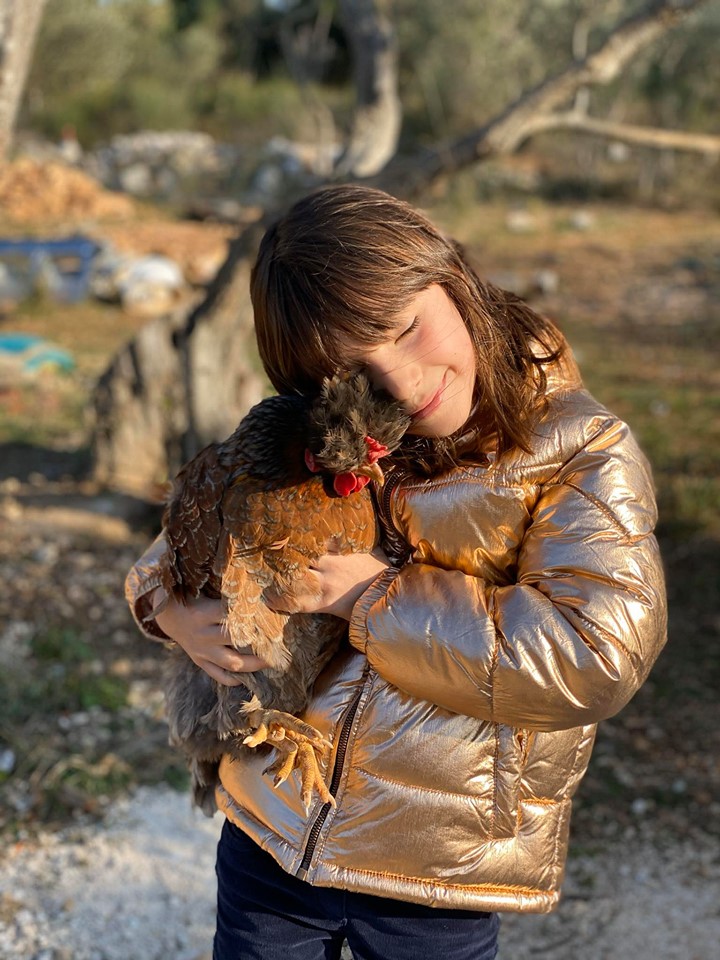
Firstly, how are you? Are you alone/with someone? Tell us a little about your situation and sanity levels.
We are very well, thank you! My husband, 7-year-old daughter and I live in Murter, which as you probably know and saw on the news is under strict quarantine! We cannot leave the island and actually are advised to not even leave our houses unless we need to go to the grocery shop or pharmacy. I personally have not left the house for 20 days. My husband does all the shopping for us and is also volunteering at the local Civil Protection Headquarters.
In my opinion, Murter has done an amazing job to slow down the spread of the infection and to keep its citizens safe.
One nice addition to our daily routine happens at 15:00 when we all sing the Murter anthem, and at 20:00 we all get out and send bengaljke (flares) into the air!

Everything has been closed since March 16th, even before the lockdown in Zagreb and the rest of Croatia with quite strict restrictions: no more than 5 people can enter the grocery shop at the time, everyone needs to keep a distance of minimum 2 meters, wear face masks, gloves and disinfect your hands and shoes. We try to keep it the same at home: no shoes or jackets from outside, wash hands regularly and stay healthy! Lots of hot liquids and vitamin C!
(Beautiful Murter on April 2, 2020)
What do you think about the economic measures the government is taking, are they helping your business?
My husband has a restaurant and I’m a wedding planner, so we are totally depending on tourism, which is currently one of the most affected sectors not just in Croatia, but all over the world. My parents who are in Moldova are facing similar problems, all apartment bookings have been cancelled all the way until June, as the country is also in complete isolation.
As for weddings, so far most of the couples who planned May and early June weddings have postponed them to later dates in September, October or moved them to 2021. We all know it's going be a difficult season, but I'm always staying positive and hope for the best!
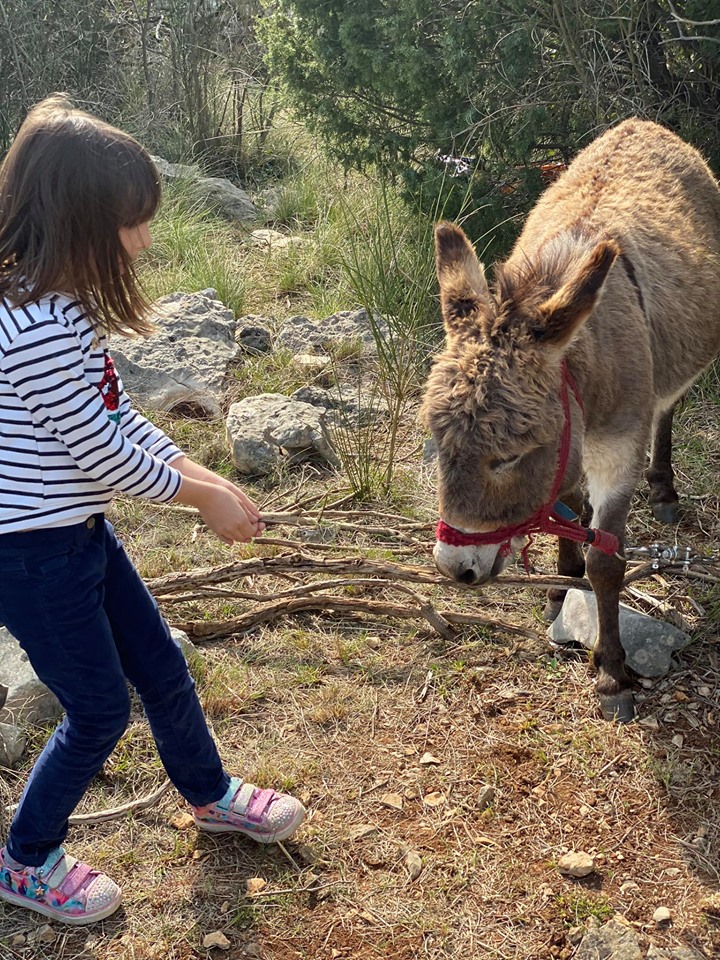
In terms of financial help from the government towards small business, so far, we have not received any support, but we have filled out the application form and are waiting for a response.
Back home, in Moldova, no funding or extensions were provided for business and everyone is obliged to pay the salaries and taxes even though everything has been shut down. So far, there is only talk and no real actions or help from the Moldavan government.
What is your impression of the way Croatia is dealing with the crisis? How safe do you feel?
I don’t watch much TV, but what I have seen so far, I’m pretty impressed at how the Croatian Government is handling the pandemic and communicating to the public. Huge applause to Vili Beroš and Alemka Markotic. I feel very safe and am looking forward for this to be over.
When did you realise that corona was going to be a big issue?
On the morning of 16th March we went out for a coffee and we were told that tby15:00 everything would have to be closed down, including all F&B outlets. We had just opened our restaurant for the season two days before. Murter was full of tourists and preparing for big regattas. We never thought this was going to last so long, and I was hoping that they would solve it in a few weeks and we could get on with our lives, but since then a lot has changed. All spring regattas have been cancelled, and the island now has few coronavirus cases and we are in complete isolation under quarantine.
Now compare that to your home country and how they are handling it. What is Croatia doing better/worse?
I think both Croatia and Moldova are doing a pretty good job.
Moldova stopped all flights from Italy as soon as we got the first few cases of coronavirus. I think they reacted really quickly and that has helped to keep the numbers quite low. Plus they have put big fines for those who leave self-isolation and for businesses who keep working. In Croatia, this came at a much later stage. Here in Murter in March, we had tourists from nearby European countries who were supposed to be in self-isolation but they were going out and drinking with locals. I wish they have brought up self-isolation restrictions and fines at a much earlier stage.

My advice what to do:
Always stay positive and be thankful for what you have! Use this time to spend with your family and kids! Do something that you didn’t have time to do before! Read, take an online course or perhaps start learning another language! See what else you are good at and how you can make your business even better, as the world won’t be the same after this is over! Nowadays, there are so many opportunities so use this time wisely!
Thanks, Tamara, stay safe and see you on the other side. If you are thinking of tying the knot and are looking for a fabulous wedding planner to help you along the way, look no further than Tamara and Adriatic Weddings Croatia.
TCN is starting a new feature series on foreign experiences of sitting out COVID-19 here in Croatia compared to their home country. If you would like to contribute, the questions are below. Please also include a para about yourself and where you are from, and a link to your website if you would like. Please also send 3-4 photos minimum to This email address is being protected from spambots. You need JavaScript enabled to view it. Subject Corona Foreigner
If you would be interested to record a video version for our partners www.rplus.video please let us know in the email. Thanks and stay safe.
Foreigners Self-Isolating in Croatia: Do You Feel Safer Than in Your Home Country?
Firstly, how are you? Are you alone/with someone? Tell us a little about your situation and sanity levels.
What do you think about the economic measures the government is taking, are they helping your business? (PLEASE IGNORE IF THIS DOES NOT AFFECT YOU)
When did you realise that corona was going to be a big issue?
What is your impression of the way Croatia is dealing with the crisis? How safe do you feel?
Now compare that to your home country and how they are handling it. What is Croatia doing better/worse?
What about official communications from the authorities, compared to your home country?
What's the one thing you wish you had taken with you into self-isolation.
One thing you have learned about yourself, and one thing you have learned about others during this crisis.
TCN has recently become a partner in Robert Tomic Zuber's new R+ video channel, initially telling stories about corona experiences. You can see the first TCN contribution from this morning, my video from Jelsa talking about the realities of running a news portal in the corona era below. If you would like to also submit a video interview, please find Robert's guidelines below
VIDEO RECORDING GUIDE
The video footage should be recorded so that the cell phone is turned horizontally (landscape mode).
There are several rules for television and video news:- length is not a virtue- a picture speaks more than a thousand words
In short, this would mean that your story should not last more than 90 seconds and that everything you say in the report should be shown by video (for example, if you talk about empty streets, we should see those empty streets, etc.).
How to do it with your cell phone? First, use a selfie camera to record yourself telling your story for about a minute and a half. Ideally, it would be taken in the exterior, except in situations where you are reporting on things in the interior (quarantine, hospital, self-isolation, etc.). Also, when shooting, move freely, make sure everything is not static.
After you have recorded your report, you should capture footage that will tell your story with a picture, such as an earlier example with empty streets.
One of the basic rules of TV journalism is that the story is told in the same way as a journalist with his text. Therefore, we ask you for additional effort. Because we work in a very specific situation, sometimes you may not be able to capture footage for each sentence of the report. In this case, record the details on the streets: people walking, the main features of the city where you live, inscriptions on the windows related to the virus, etc.
The same rules apply if you are shooting a story from your apartment, self-isolation, quarantine. We also need you to capture footage that describes your story.
When shooting frames to cover your reports, it is important that you change the angle of the shot (in other words, shoot that empty street from several angles). Also, when shooting a detail, count at least five seconds before removing the camera to another detail.
The material should be about 5 minutes long (90 seconds of your report + frames to cover your story).
After recording everything, send us to Zagreb, preferably via WeTransfer to This email address is being protected from spambots. You need JavaScript enabled to view it.
Foreigners Self-Isolating in Croatia: Do You Feel Safer? Mariann from Hungary in Zagreb
April 5, 2020 - Do foreigners in Croatia feel more or less safe sitting out COVID-19 here than in their home country, and what are their experiences? A new series on TCN, with Mariann from Hungary in Zagreb as our 25th contributor.
Oxford University recently published some research on government responses to coronavirus which showed that Croatia currently has the strictest measures in the world. While inconvenient, this is a good thing in terms of reducing the spread of the virus, and I am certainly not alone in my admiration of the official Croatian handling of this crisis in recent weeks, both in terms of action and communication.
But what do other expats here think? And how does it compare with the response in their home country? Would they rather sit this one out here or there? In the first of a new series on TCN, we will be featuring expats from all over the world to see what their views are on life in corona Croatia rather than back home. So far we have heard from expats in Croatia from Romania, USA, Ireland, UK, Mexico, Argentina, Spain, Singapore, Holland, Canada, India, Hong Kong, Venezuela, Latvia, China, Honduras and Germany. Next up, Mariann from Hungary in Zagreb.
If you would like to contribute to this series, full details are below. Now, over to Mariann.
Firstly, how are you? Are you alone/with someone? Tell us a little about your situation and sanity levels.
Thank God, I'm not alone. I am with my family. The sanity level is adequate.
What do you think about the economic measures the government is taking, are they helping your business?
I think the government is beginning to take heed of the demands of the group named Glas Poduzetnika, which voices many entrepreneurs’ view on the effect the virus is having on business. The 4000 kuna pay will be helpful to many, although the amount of the sum is debatable.
As I’m a sole proprietor (translator and copywriter) I don't think I will have the right to receive the sum, as this month’s revenue hasn’t gone down 50%. It remains to be seen whether the same will be the case for April - then I will apply for the emergency fund.
When did you realise that corona was going to be a big issue?
I realised the gravity of it somewhere in mid-March. A bit later. The reason for it is that I had asthma and a high temperature at the beginning of March and was taken to hospital to receive medication. Everyone was worried that I might have Corona.
Then the earthquake in Zagreb struck the following week and it became pretty unbearable. I have been following the news every day since then.
What is your impression of the way Croatia is dealing with the crisis? How safe do you feel?
I don’t know whether the Oxford university study is right, but if it is, then Croatia is really a big hero in this situation. Swift handling, clear guidelines - If everyone follows them, then it should be ok. The question is, how much longer will we have to bear this isolation?
Now compare that to your home country and how they are handling it. What is Croatia doing better/worse?
As I have been living in Zagreb now for more than 30 years, it’s understandable that my focus is more or less on Croatia.
I only heard the devastating news of democracy being overthrown by Orban power. This has been going on in milder degrees in recent years, with some media challenging his authority being wiped out, but now it really escalated.IThe measures Orban took, though, are very good, in my opinion. These measures preceded the measures of the Croatian government and they have been more or less “copied” (here many would prove me wrong, but I have this opinion). Orban instantly acted by relieving businesses of paying taxes and social contributions until July, whereas here it was not clear whether a delay or write off would ensue. Some pressure was needed to make that happen.
What about official communications from the authorities, compared to your home country?
Unfortunately, I can’t provide a comparative answer. I only know how the Croatian authorities communicated, which to me seems just right.
What's the one thing you wish you had taken with you into self-isolation?
I have everything I need here with me. My family is with me.
One thing you have learned about yourself, and one thing you have learned about others during this crisis.
I have learned to be even more humane, to offer help. I have also learned to obey since it’s important to listen to what the true experts say, and not some wannabe experts. And to be content with what I have.
If you need translation services, you can contact Mariann on www.tralangia.com
Thanks, Mariann, stay safe and see you on the other side.
TCN is starting a new feature series on foreign experiences of sitting out COVID-19 here in Croatia compared to their home country. If you would like to contribute, the questions are below. Please also include a para about yourself and where you are from, and a link to your website if you would like. Please also send 3-4 photos minimum to This email address is being protected from spambots. You need JavaScript enabled to view it. Subject Corona Foreigner
If you would be interested to record a video version for our partners www.rplus.video please let us know in the email. Thanks and stay safe.
Foreigners Self-Isolating in Croatia: Do You Feel Safer Than in Your Home Country?
Firstly, how are you? Are you alone/with someone? Tell us a little about your situation and sanity levels.
What do you think about the economic measures the government is taking, are they helping your business? (PLEASE IGNORE IF THIS DOES NOT AFFECT YOU)
When did you realise that corona was going to be a big issue?
What is your impression of the way Croatia is dealing with the crisis? How safe do you feel?
Now compare that to your home country and how they are handling it. What is Croatia doing better/worse?
What about official communications from the authorities, compared to your home country?
What's the one thing you wish you had taken with you into self-isolation.
One thing you have learned about yourself, and one thing you have learned about others during this crisis.
TCN has recently become a partner in Robert Tomic Zuber's new R+ video channel, initially telling stories about corona experiences. You can see the first TCN contribution from this morning, my video from Jelsa talking about the realities of running a news portal in the corona era below. If you would like to also submit a video interview, please find Robert's guidelines below
VIDEO RECORDING GUIDE
The video footage should be recorded so that the cell phone is turned horizontally (landscape mode).
There are several rules for television and video news:- length is not a virtue- a picture speaks more than a thousand words
In short, this would mean that your story should not last more than 90 seconds and that everything you say in the report should be shown by video (for example, if you talk about empty streets, we should see those empty streets, etc.).
How to do it with your cell phone? First, use a selfie camera to record yourself telling your story for about a minute and a half. Ideally, it would be taken in the exterior, except in situations where you are reporting on things in the interior (quarantine, hospital, self-isolation, etc.). Also, when shooting, move freely, make sure everything is not static.
After you have recorded your report, you should capture footage that will tell your story with a picture, such as an earlier example with empty streets.
One of the basic rules of TV journalism is that the story is told in the same way as a journalist with his text. Therefore, we ask you for additional effort. Because we work in a very specific situation, sometimes you may not be able to capture footage for each sentence of the report. In this case, record the details on the streets: people walking, the main features of the city where you live, inscriptions on the windows related to the virus, etc.
The same rules apply if you are shooting a story from your apartment, self-isolation, quarantine. We also need you to capture footage that describes your story.
When shooting frames to cover your reports, it is important that you change the angle of the shot (in other words, shoot that empty street from several angles). Also, when shooting a detail, count at least five seconds before removing the camera to another detail.
The material should be about 5 minutes long (90 seconds of your report + frames to cover your story).
After recording everything, send us to Zagreb, preferably via WeTransfer to This email address is being protected from spambots. You need JavaScript enabled to view it.
Post-Corona Tourism Planning: Hope is Not a Good Business Strategy
April 5, 2020 - In the latest in his series on planning for post-corona tourism, Zoran Pejovic of Paradox Hospitality on the need to think longterm and resist using hope as a business strategy.
It seems that most people are still locked in some sort of disbelief or shock over the ongoing Coronavirus crisis, even though most of the Western world has been in the lockdown for a couple of weeks now. I don’t know how else to explain such a glaring lack of strategic thinking on behalf of some, otherwise very sane and thoughtful people.
Before moving on, I have a question for people not wanting to address the longterm economic aspects of the lockdowns and quarantine. What is the purpose of this? Do you sincerely believe that you are proving your moral superiority by not even wanting to engage in talks about the economic aspects of the crisis? No, that doesn’t make you morally superior, if anything it makes you blind. On top of that, this is a false dichotomy. You can fully support all the aspects of the lock-down and quarantine, and still discuss how many people are going to lose their jobs over it, how many lives will be lost due to the economic downturn, how many businesses will bankrupt and how the way we do things is going to change.
Now, that I have gotten that off my chest, I must start by saying that hope is not a good business strategy. I have already written on the need for scenario planning, which is an amazing tool, especially when it comes to answering the questions on future trends and recognizing changes that come with those trends. In this crisis, scenario planning is a great tool that might be used to answer some of your budgetary questions as well. Recognizing the right scenario might save you some money in your wallet. The biggest question that all the businesses are facing right now is how long will this last, and scenario planning is a perfect tool to use in this case.
Nevertheless, if you have answered some of your more practical questions, on how to keep you and your teams safe and introduced remote work, and signed up for all Zoom and Slack apps, and when you have answered some of the budgetary questions, by planning different cashflows based on different scenarios, the longterm strategic questions still remain to be answered.
If you survive this crisis, do you want your business to grow or to scale? If you don’t know the difference, it is time to read up.
The biggest question you have to ask yourself though, is whether your product will have a demand after the crisis is over, whether the processes you have in place will be affected and whether your business model will still be viable. These are the three key aspects of your business that you need to think about deep and think about hard. These are also the three aspects of your business that require you to put your innovator’s hat on as well. When people usually think about innovation, they usually consider product innovation, but a larger space for improvement lies in the process innovation and the business model itself.
Let’s apply this to the hotel that largely focuses on the conference segment, as an example.
If your hotel is a conference hotel and that is your main product, you might be at a large disadvantage after this crisis is over. Many businesses have already moved to Zoom conferencing and might stay there indefinitely, and even those that will want physical conferences, conventions and seminars will be more cautious for a while due to reputation damage that might follow should something undesirable occur, such as a new outbreak for example. So, you need to be thinking about changing your product. Perhaps moving into a more wellbeing retreat center could work for your hotel. You need to be thinking who is buying your products, businesses or individuals. Individuals might be less risk-averse in the immediate post-crisis times then businesses, which might inform some of your longer-term, strategic decisions.
When it comes to process innovation, there is much to be done here. Processes and process innovations are often not visible to the guests, so it is often disregarded as less important, even though this is where you usually save your money. However, I am thinking that it might be the time to bring some of those invisible processes to the front and show it to the guests. If your hotel has maintained the reputation of having an amazingly silent and invisible housekeeping service, you might need to be thinking about bringing these services forward now, making them visible. People are motivated largely by prevention emotions, so playing to their sense of safety by making the cleaning process more visible and more prominent, might be one of the ways to go.
Finally, the innovation of the business model of the hotel industry has been a long time coming. Currently, hotels operate under one of the four models, under hotel management agreements, branded or unbranded, under franchise agreements, as owner/family operation or as under lease agreements. This is the one where I can’t bring forward many solutions, but you need to be thinking about all your stakeholders, and sharing the fruits of the success when it is all good, but also responsibility for surviving downturns more across the board.
You can read more on this subject of post-coronavirus travel from Zoran here:
Travel Industry: Keep Communicating and Visibility
Build Scenarios! Be Present! Take Time to Think!
Post-Coronavirus Travel and Tourism: Some Predictions
Croatian Tourism 2020 and Coronavirus: Let’s Postpone the Season
You can connect with Zoran Pejovic via LinkedIn.
After you have looked at all of this, think about your purpose, why do you do what you do, and will that fit into the new, emerging world. Think deep and think hard. You might come out of this crisis stronger than you thought possible.
Want Some Good COVID-19 News? Hvar Corona Patient Has Recovered!
April 4, 2020 - Is there any such thing as good COVID-19 news? Great news for Croatia's premier island, as the only Hvar corona case has made a full recovery.
There are certain moments on all our memories when the COVID-19 reality got a little more real and closer to home.
A big one for me came on March 20, 2020 when I reported on something I hoped I would never have to report on - the first Hvar corona case in gorgeous Vrboska, just 3 km from my front door:
According to local media reports, the man had recently returned from Austria, where he has been working as a waiter. During his travels in Croatia, he used the train twice, the bus once, and the Jadrolinija ferry, Zadar.
Local media report that he followed all the rules on self-exclusion, and when he noticed the first signs of the disease, he contacted the doctors, and when the tests turned out to be positive, he was transferred to a hospital in Split.
And if one case had come, how many more cases and infections would there be. A mild panic set in.
Dalmatia is never the best place to establish facts, and rumours abound. I am apparently the regional section chief of MI6, for example. And the CIA. And Mossad. And while it might be true that I run one of them, I clearly cannot do all three, as there would be no time left for blogging.
I digress.
Thankfully, I have reliable local sources in Vrboska, and so am able to work through the rumours.
I got information today that the Vrboska man who had the infection is now fully recovered. Great news!
As well as the fact that all his immediate family and close circle were put in isolation, and none has shown any symptoms.
In some ways, this has been a good thing for Hvar, for the case brought it brutally home that Hvar corona was something that was real and could spread. I have been REALLY impressed at the success of restricted movement on the island, and I obviously feel a lot safer now for my family with this news.
But I also want to say a big thank you to the man who was infected. TCN's Joe Orovic did a brilliant piece yesterday on the social stigma now being attached to people who are corona positive in the community.
According to my information, the 40-year-old man was working as a waiter in Austria when the bar he was working in closed due to corona. He had little option but to return home.
At the Croatian border, he received instructions on travel and self-isolation. He wore a mask and gloves all the way home, staying apart from others as much as possible by shutting himself away from the rest of the family in an attic room.
When he showed symptoms, he was taken to Split, and all his contact circle put into isolation.
It is certainly not his fault that he contracted the virus, and I applaud his sense of responsibility which - fingers crossed - seems to have been effective.
If everyone else does the same, the chances of success will be all the higher.
I will sleep a little easier tonight.
For the latest on the corona crisis, follow the dedicated TCN link.
Foreigners Self-Isolating in Croatia: Do You Feel Safer? Monique from Honduras in Split
April 4, 2020 - Do foreigners in Croatia feel more or less safe sitting out COVID-19 here than in their home country, and what are their experiences? A new series on TCN, with Monique Laffite from Honduras as our 24th contributor.
Oxford University recently published some research on government responses to coronavirus which showed that Croatia currently has the strictest measures in the world. While inconvenient, this is a good thing in terms of reducing the spread of the virus, and I am certainly not alone in my admiration of the official Croatian handling of this crisis in recent weeks, both in terms of action and communication.
But what do other expats here think? And how does it compare with the response in their home country? Would they rather sit this one out here or there? In the first of a new series on TCN, we will be featuring expats from all over the world to see what their views are on life in corona Croatia rather than back home. So far we have heard from expats in Croatia from Romania, USA, Ireland, UK, Mexico, Argentina, Spain, Singapore, Holland, Canada, India, Hong Kong, Venezuela, Latvia, China and Germany. Next up, Monique Laffite from Honduras in Split.
If you would like to contribute to this series, full details are below. Now, over to Monique.
I am from Honduras, of course I feel safer here than in my home country. Oh, you mean because of Covid-19? Meh. Honduras follows stricter rules than Croatia but I feel as safe here as I would in Honduras, as long as I am healthy.
We have self-isolated, and become more aware of how we interact with people, and follow the guidelines of the experts. I feel safe here because of the measures I have taken for myself. But would I feel safer in Honduras if I became sick? Maybe.
I think speaking the language is key, and although pricam malo Hrvatski and get by with it, I think when your life is on the line, its best to know exactly what you are saying. The experience scares me more than the virus.
Firstly, how are you? Are you alone/with someone? Tell us a little about your situation and sanity levels.
I make tacos for a living and tacos, righfully so, are deemed essential. My life has been adjusted to deal with Covid-19, but has not changed dramatically. I have not yet spent a full 24 hours at home, I work every day.
My mom taught me to wash my hands when I was little, so all this hasn’t come as shock to me. I run a restaurant, you always have to be extra careful. Nothing extraordinary happens behind the scenes for us, we keep our hands clean, our surfaces clean, hair pulled back, and we roll away.
I don’t do masks or gloves. I think both can give you a sense of false security. I think you have a better chance of touching your face with dirty gloves, than you would with dirty hands. I do not stand in spitting distance of others, so I don’t use the mask either. That spitting distance thing should apply always though. I see you Summer 2016.
I walk to work every morning, and once my shift is done, I walk directly back. I stay home the rest of my day. I can acknowledge that being able to go to work is a privilege these days, so I do not abuse it.
What do you think about the economic measures the government is taking, are they helping your business?
I have yet to see any economic measures implemented by the government that help my business. We are out here to save ourselves. But to be quite honest, haven’t we always? Before Covid-19, we had to fight the government to be able to operate. And somehow now they’ll come to our rescue? I’ve lived in Croatia long enough to know that was not going to happen.
I make about 10% of the sales I made at this time last year. We do not even break even, we are at a loss. We do this for our staff. I currently have two people working with us, they would not qualify for unemployment (because they did not work 9 months straight) and there is no assistance for them (because they weren’t hired before February). We do this to keep them employed and paid. They are both Croatian. And I could bet you a million kuna that once this is over, I will have work inspection knocking on my door telling me I violated some stupid clause under some tiny print for keeping these two kids employed during this time.
My accountant told me yesterday that the government might be able to cover the minimum wage for my two workers in April, (we cover the rest) so I better keep quiet before I get flagged haha.
I think you will start to see a lot of businesses fold, and I completely understand. I have spoken to other business owners and their mentality is this: Summer 2020 will be awful, and many businesses will not survive. The government will not assist us, so we will bankrupt the businesses and screw them back, save what we have now, and come back at the beginning of 2021 and get ourselves a new place. Rent prices will drop dramatically, and the city will be up for grabs. There won’t be a shortage of workers anymore. Tables will turn.
It’s selfish, that is not the way I plan on doing things, but it’s survival mode. I get it.
When did you realise that corona was going to be a big issue?
I can’t remember when this got out of hand, felt like from one day to the next. I think Croatia is following what others are doing. I think we all got scared when we saw what happened to Italy, and well, they are our neighbors, so I get why Croatia reacted the way it did.
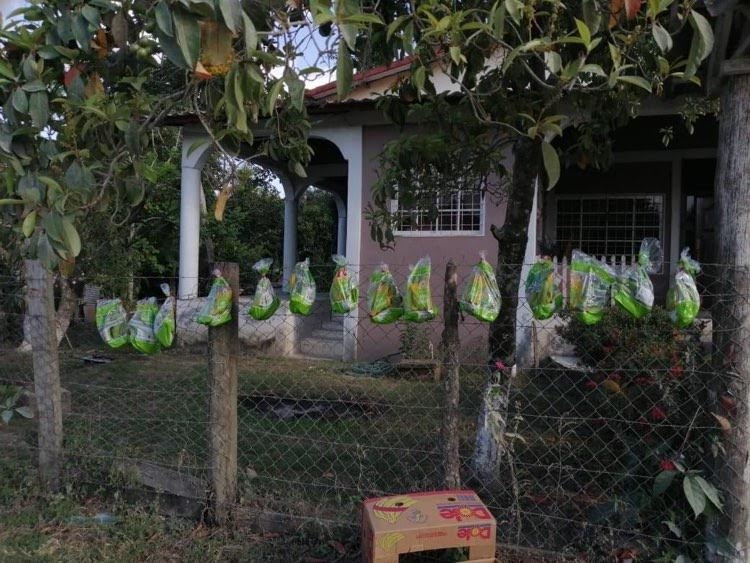
(On Mondays, Wednesdays and Fridays you can see bags like these hanging from people’s fences. They are filled with soap, rice, beans, etc. so those that can’t afford it can come and grab. Poverty in Honduras and poverty in Croatia mean two very different things.)
Now compare that to your home country and how they are handling it. What is Croatia doing better/worse?
The measures in Honduras are strict. They are in quarantine. These are their guidelines:
- Everyone is in quarantine, except for medical staff, journalism, food providers, banks, and gas stations.
- Monday, Wednesday and Friday are the only days when people can go out of their homes.
- Those with an OIB ending in 1, 2, and 3 can go out on Monday from 9 am to 3 pm. Those with an OIB in 4, 5, and 6 on Wednesday. And 7,8,9, and 0 on Friday.
- People 60 and over, pregnant women, and those with medical conditions are allowed to leave their homes from 7:00 to 9:00 on the day that their OIB allows them. That way the banks and supermarkets are not full when they arrive. The rest are allowed at 9 am.
- “Ley Seca”, means “Dry Law”. No liquor is being sold.
- If you are caught out on the streets and it is not one of your days, you are taken into a 24-hour holding cell and your car is impounded for the rest of the crisis.
There are 219 people infected in Honduras, we have a population of 9.2 million people. There are only 100 ventilators in the whole country. Honduras is a third world country, with a 66% poverty rate. Croatia doesn’t need these extreme measures.
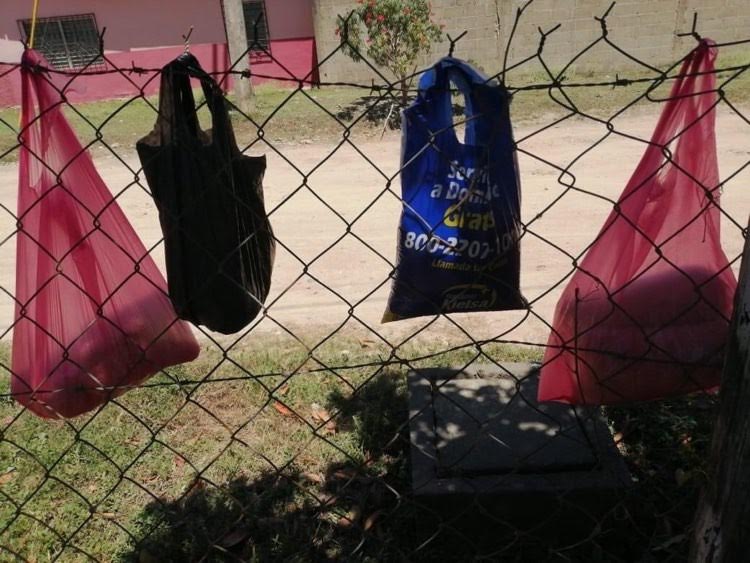
What about official communications from the authorities, compared to your home country?
I respect Daniela and Lauren from TCN to relay trustworthy information. The ‘ol google translate had me losing my marbles. I have Croatian people around me giving me false information because that’s what they heard from so and so. I get my information from the news, and the gossip at the check-out counter at Konzum doesn’t get to me because I don’t understand what they are saying, so in this case, not knowing Croatian is helpful. Honduras has a gem of a president, similar to America, so people rely mostly on journalists to give them accurate information.
What's the one thing you wish you had taken with you into self-isolation.
A crystal ball, some tarot cards to tell me when this is all gonna be over! I realized I took everything for granted. This has changed my way of thinking about my future definitely.
What's the one thing you wish you had taken with you into self-isolation.
This does not end on a happy note if you’d like to stop reading. I’ve learned that we have spent most of our lives fighting and accommodating those in need, fighting for rights, and demanding justice. Unless we are all on the same boat. I have a friend in New Orleans that is a judge and most of the people booked this past week are domestic violence offenders. We demand people lock themselves in their homes (granted, there is no law that says this in Croatia) and expect they stay there without knowing a single thing about what awaits them inside. We shame them publicly if they don’t. Wasn’t it just a month or a couple weeks ago we marched the streets against this? We’ve ultimately locked men and women in their homes, not knowing what type of home we have locked them in, and if one of them needs to leave or blow off some steam, well, we yell #OstaniteDoma. I stay home so others can walk the streets for reasons that are none of my business.
I have also learned that in a world where we welcomed people’s opinions and encourage narrative, if you don’t have the same opinion as those in charge, they’ll use it to try to shame you.
Thanks, Monique, stay safe and see you on the other side.
TCN is starting a new feature series on foreign experiences of sitting out COVID-19 here in Croatia compared to their home country. If you would like to contribute, the questions are below. Please also include a para about yourself and where you are from, and a link to your website if you would like. Please also send 3-4 photos minimum to This email address is being protected from spambots. You need JavaScript enabled to view it. Subject Corona Foreigner
If you would be interested to record a video version for our partners www.rplus.video please let us know in the email. Thanks and stay safe.
Foreigners Self-Isolating in Croatia: Do You Feel Safer Than in Your Home Country?
Firstly, how are you? Are you alone/with someone? Tell us a little about your situation and sanity levels.
What do you think about the economic measures the government is taking, are they helping your business? (PLEASE IGNORE IF THIS DOES NOT AFFECT YOU)
When did you realise that corona was going to be a big issue?
What is your impression of the way Croatia is dealing with the crisis? How safe do you feel?
Now compare that to your home country and how they are handling it. What is Croatia doing better/worse?
What about official communications from the authorities, compared to your home country?
What's the one thing you wish you had taken with you into self-isolation.
One thing you have learned about yourself, and one thing you have learned about others during this crisis.
TCN has recently become a partner in Robert Tomic Zuber's new R+ video channel, initially telling stories about corona experiences. You can see the first TCN contribution from this morning, my video from Jelsa talking about the realities of running a news portal in the corona era below. If you would like to also submit a video interview, please find Robert's guidelines below
VIDEO RECORDING GUIDE
The video footage should be recorded so that the cell phone is turned horizontally (landscape mode).
There are several rules for television and video news:- length is not a virtue- a picture speaks more than a thousand words
In short, this would mean that your story should not last more than 90 seconds and that everything you say in the report should be shown by video (for example, if you talk about empty streets, we should see those empty streets, etc.).
How to do it with your cell phone? First, use a selfie camera to record yourself telling your story for about a minute and a half. Ideally, it would be taken in the exterior, except in situations where you are reporting on things in the interior (quarantine, hospital, self-isolation, etc.). Also, when shooting, move freely, make sure everything is not static.
After you have recorded your report, you should capture footage that will tell your story with a picture, such as an earlier example with empty streets.
One of the basic rules of TV journalism is that the story is told in the same way as a journalist with his text. Therefore, we ask you for additional effort. Because we work in a very specific situation, sometimes you may not be able to capture footage for each sentence of the report. In this case, record the details on the streets: people walking, the main features of the city where you live, inscriptions on the windows related to the virus, etc.
The same rules apply if you are shooting a story from your apartment, self-isolation, quarantine. We also need you to capture footage that describes your story.
When shooting frames to cover your reports, it is important that you change the angle of the shot (in other words, shoot that empty street from several angles). Also, when shooting a detail, count at least five seconds before removing the camera to another detail.
The material should be about 5 minutes long (90 seconds of your report + frames to cover your story).
After recording everything, send us to Zagreb, preferably via WeTransfer to This email address is being protected from spambots. You need JavaScript enabled to view it.
Can Someone Receive Wrong Coronavirus Test Result? Capak Weighs In
As Poslovni Dnevnik writes on the 4th of April, 2020, the director of the Croatian Institute of Public Health, Krunoslav Capak, revealed how often doctors are tested for coronavirus for Dnevnik Nova TV. Reporter Valentina Baus spoke with him.
Krunoslav Capak, director of the Croatian Institute of Public Health, said the testing of doctors for coronavirus extends to those who return to work after self-isolation and to those who are positive and have yet to return to work. "It's already being done. And there should be more testing for those doctors who work on wards with at-risk patients,'' Capak said.
He added that there was no rule on how often doctors should be tested. "If there are epidemiological indications, then they're tested," he says. Otherwise, the test result is valid for 24 hours. "Then you can become positive. Negativity doesn't mean that someone won't develop positivity to the virus later on,'' explained the CIPH Director.
He also referred to Split-Dalmatia County, where the number of patients has increased in recent days. "I wouldn't say the situation has escalated. They had one peak where there were a lot of people sick in one day, but it should be noted that it is a large county with a lot of inhabitants,'' Capak said.
He also revealed if there could be an error in testing that made a positive person receive a negative coronavirus test result and vice versa.
"There are so many situations where an analyst cannot be sure of a single test, then put +/- and the test is repeated. There were a lot of such situations, and as for someone being issued with the wrong test result - I don't know about such a situation,'' Capak explained.
He also said that he was in contact with colleagues from neighbouring Bosnia and Herzegovina and Montenegro and that he had also spoken with colleagues from Italy.
Follow our dedicated section for more on coronavirus in Croatia.
Efficiency and Rationality Crucial in Dealing with Coronavirus Fallout
ZAGREB, April 4, 2020 - Efficiency and rationality will be crucial in dealing with the fallout of the coronavirus epidemic, given the limited resources that will be available in the time ahead, Finance Minister Zdravko Marić said in a newspaper interview on Saturday.
"Efficiency must be the first and basic criterion for all our further actions. A rapid response and adjustment to new situations and business conditions will differentiate those who are successful from those less successful, not just in the enterprise sector but in the public sector as well," Marić told Vecernji List.
He said that the present crisis had revealed the necessity to change the structure of the Croatian economy, which currently has a relatively low share of industry and a large share of the services sector in added value and is considerably dependent on imports.
"The national economy will need to be transformed to make it more export-oriented and to better utilise our comparative advantages. This crisis has shown the importance of agriculture and the food industry in securing sufficient supplies for our population because in the event of transport disruptions and closure of the borders it is extremely important to have sufficient amounts of food from domestic sources. It has also shown the importance of the domestic pharmaceutical industry, including the production of medicines, protective agents and medical equipment," the finance minister said.
Marić said that the IT industry and digitisation had turned out to be very important because they made it possible for all the measures, both epidemiological and economic ones, to be implemented quickly and effectively, and the industry's adaptability allowed both the private and the public sector to adapt to teleworking relatively painlessly.
"These examples show the direction in which way the future economic strategy and economic policy measures should be going," Marić concluded.
More coronavirus news can be found in the Lifestyle section.
Pulse of Glas Poduzetnika: Perception of Minister Horvat Changes after New Measures
April 4, 2020 - Members of the Glas Poduzetnika (Voice of Entrepreneurs) Association give their verdict on Minister of Economy Darko Horvat after the latest economic measures were announced.
Last week’s poll about public perception of minister Horvat, made after the first set of inadequate and inefficient measures, has shown worrying results and perception in the private sector. Following that, there were rumours of relieving the minister of his position. The reaction was pretty quick, and new, much more thought out measures were taken, similar to what the GP Initiative suggested. After that, we repeated the public poll about the public perception of the work of minister Horvat and we got noticeable changes in a positive direction:
The number of people who consider that minister Horvat doesn’t do a good job (and that he should think about resigning) has gone down by 22% percent. An additional 21.8% begin to perceive his actions in a more positive light (mostly because of the Glas Poduzetnika Initiative) and thinks he is improving. Although they are few, we are finally beginning to see some people who think he is doing a good job - 1% to be precise.
Although the result as a whole is far from good or acceptable, the encouraging fact is that the entrepreneurs are ready to change their perceptions based on incoming new information. They are not tied by ideology, furthermore, they recognize results and quality decision making. Differences measured in tens of percentage points suggest that, with a few good decisions and good and transparent communication, perception and even popularity can be changed easily and for the better, as demonstrated by minister Beroš's situation.
The association Glas Poduzetnika was formally formed today. You can learn more about that, as well as its structure and aims in this press release.
For the latest on the coronavirus crisis, follow the dedicated TCN section.
893 Croatians Repatriated to Date, Hundreds to Return This Weekend
ZAGREB, April 4, 2020 - A total of 893 Croatians have been repatriated since the outbreak of the coronavirus epidemic and several hundred are due to return this weekend, Foreign Minister Gordan Grlić Radman said on Saturday.
A total of 155 passengers, mostly Croatians as well as several citizens of Slovenia, Bosnia and Herzegovina, and Montenegro, are arriving in Zagreb on Saturday evening aboard special Croatia Airlines flights from Portugal, Spain, Italy and Sweden, he said.
The Ministry of Foreign and European Affairs has sent protective masks and gloves for the passengers, who will need to observe social distancing rules. Upon arrival at the airport, they will be examined by doctors and will be ordered into quarantine or self-isolation if necessary, the minister said, noting that it was the government's obligation under the constitution to ensure repatriation of Croatian nationals.
On Sunday, 37 Croatians are due to arrive in Zadar by catamaran from Ancona and more than a hundred are expected to arrive in several buses from Tyrol.
Grlić Radman said that the governments of Slovenia, Hungary, Austria and Italy had helped the Croatian authorities with previous repatriations. "This situation has shown how solidary we can be and how much we can do together. When you act alone, you cannot do much but you need to work in cooperation with others."
A total of 893 Croatians have been repatriated to date, including 564 from third countries such as India, the United Arab Emirates (Dubai), Morocco and Peru. Last week, 13 Croatians returned by bus from Tyrol, and as many arrived in a six-car convoy last night, the minister said.
More coronavirus news can be found in the Lifestyle section.

